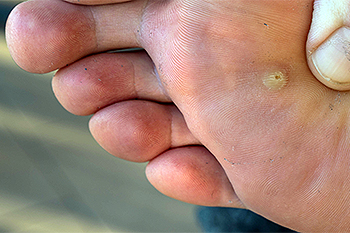How Plantar Warts Spread
Tuesday, 08 February 2022 00:00 Plantar warts, which may also be referred to as verrucae, grow on the soles of the feet or around the toes because of the Human Papilloma Virus (or HPV). This is a highly contagious virus that thrives in warm and moist environments, such as pools, locker rooms and communal showers. HPV is both contagious through person to person contact and simply by walking through the same floor area as someone who has a wart. When plantar warts form, they will appear as a small growth with a tiny black dot in the center (usually dried blood), and they can be very painful. Plantar warts can grow as large as a centimeter in diameter, or can even form into a cluster of multiple warts. While plantar warts may be very painful, especially when pressure is applied, they are harmless. However, patients who are have a painful plantar wart, or recurring plantar warts, would be wise to schedule a visit with a podiatrist.
Plantar warts, which may also be referred to as verrucae, grow on the soles of the feet or around the toes because of the Human Papilloma Virus (or HPV). This is a highly contagious virus that thrives in warm and moist environments, such as pools, locker rooms and communal showers. HPV is both contagious through person to person contact and simply by walking through the same floor area as someone who has a wart. When plantar warts form, they will appear as a small growth with a tiny black dot in the center (usually dried blood), and they can be very painful. Plantar warts can grow as large as a centimeter in diameter, or can even form into a cluster of multiple warts. While plantar warts may be very painful, especially when pressure is applied, they are harmless. However, patients who are have a painful plantar wart, or recurring plantar warts, would be wise to schedule a visit with a podiatrist.
Plantar warts can be very uncomfortable. If you need your feet checked, contact Dr. Robert Marcus from Foot & Ankle Center of Teaneck. Our doctor will assist you with all of your foot and ankle needs.
About Plantar Warts
Plantar warts are the result of HPV, or human papillomavirus, getting into open wounds on the feet. They are mostly found on the heels or balls of the feet.
While plantar warts are generally harmless, those experiencing excessive pain or those suffering from diabetes or a compromised immune system require immediate medical care. Plantar warts are easily diagnosed, usually through scraping off a bit of rough skin or by getting a biopsy.
Symptoms
- Lesions on the bottom of your feet, usually rough and grainy
- Hard or thick callused spots
- Wart seeds, which are small clotted blood vessels that look like little black spots
- Pain, discomfort, or tenderness of your feet when walking or standing
Treatment
- Freezing
- Electric tool removal
- Laser Treatment
- Topical Creams (prescription only)
- Over-the-counter medications
To help prevent developing plantar warts, avoid walking barefoot over abrasive surfaces that can cause cuts or wounds for HPV to get into. Avoiding direct contact with other warts, as well as not picking or rubbing existing warts, can help prevent the further spread of plantar warts. However, if you think you have developed plantar warts, speak to your podiatrist. He or she can diagnose the warts on your feet and recommend the appropriate treatment options.
If you have any questions please feel free to contact our office located in Teaneck, NJ . We offer the newest diagnostic and treatment technologies for all your foot and ankle needs.
Read more about All About Plantar Warts




